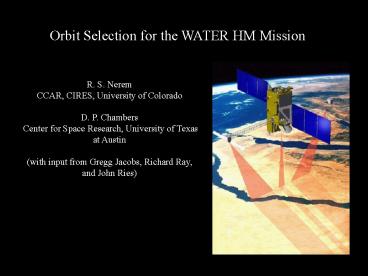Sea Level Slides PowerPoint PPT Presentation
1 / 22
Title: Sea Level Slides
1
Orbit Selection for the WATER HM Mission
R. S. Nerem CCAR, CIRES, University of
Colorado D. P. Chambers Center for Space
Research, University of Texas at Austin (with
input from Gregg Jacobs, Richard Ray, and John
Ries)
2
General Constraints on Search
- No sun-synchronous orbits
- Altitudes lower than 1000 km to avoid radiation
exposure - Inclinations greater than 75 in order to sample
most rivers in Siberia - Repeat period 20-days in order to meet
groundtrack spacing requests of mesoscale
oceanography and hydrology (10 days was also
considered to meet a request for higher temporal
resolution studies)
3
Sun Synchronous Orbits
4
Why not Sun-Synchronous Orbits?
- Prevents Serious Tidal Studies
- Tides poleward of 66
- Tides in shallow water and estuaries
- Wavelengths shorter than 300 km
- Maps Diurnal Errors to Undesirable Periods
- Into long-period climate-like signals
- Into seasonal variations (annual, semi-annual)
- Into the mean sea surface
5
Calculating Tidal Aliasing
- P is satellite repeat period
- T is tide period
- ?p is tide alias period
6
Aliasing Considerations
- For applications in oceans and estuaries, we
desire a satellite orbit that aliases all tides
to frequencies greater than 2 cycles-per year - The alias period is shorter than the semi-annual
(half-year) signal - Can observe multiple cycles of the alias period
within a few years - Another important factor to consider is the
separation between alias frequencies and between
the aliases and annual/semi-annual (Df) - Determines time needed to separate two tides in
altimeter observations - Time to separate 1/Df
- T/P did not have optimal separation for some
constituents - K1 aliased to within 0.11 cpy of semi-annual
- 9-years to separate
7
Tidal Aliasing 10 Day Repeat
8
Tidal Aliasing 20 Day Repeat
9
Tidal Aliasing 20 Day Repeat
10
Orbit 1 Altitude 845.111 km Inclination
78 Repeat Period 20.86521 days
Orbit 2 Altitude 845.859 km Inclination
78 Repeat Period 21.85882 days
Except for K1, these two orbits have very good
aliasing properties for 9 major constituents
11
General Observations
- Only orbits with an inclination lt 66 alias all
major constituents to frequencies gt 2 cpy - Retrograde orbits have poor aliasing of solar
tides - If we do not require that the K1 alias gt 2 cpy
- Good orbits do exist up to 80 inclination
- This covers more of the Arctic Ocean, all of the
Antarctic boundary, and most rivers in Siberia
12
Shallow Water Tides
- In shallow water (including estuaries) tides are
nonlinear and have much smaller wavelength than
in the deep ocean - In 40 m, tide wavelength is 10x smaller than in
4000m - Shallow water tides are poorly observed by
current altimeter systems - Examine aliasing of select nonlinear tides for
potential orbits
13
Aliasing of Nonlinear Tides
Orbit 1 Altitude 845.111 km Inclination
78 Repeat Period 20.86521 days
Orbit 2 Altitude 845.859 km Inclination
78 Repeat Period 21.85882 days
Some close aliases between nonlinear and primary
tides
14
Comments on the Orbit
- .. many coastal locations at mid to high
latitudes would be sampled twice in each 10-day
orbit, for a repeat of about 5 days. Those
interested in coastal applications prefer that
this repeat time not be increased. Five days will
still not resolve the rapid coastal ocean
response to synoptic forcing (periods of 1-5
days), relying on models to assimilate the SSH
data and provide the higher temporal resolution
needed. T. Strub - The basic recommendation on orbits for mesoscale
is for full coverage. So I would lean toward the
longer repeat ( 20 days) if the swath were 60 km
to each side. Tidal aliasing should be considered
for mesoscale. G. Jacobs - Inclination greater than 74, temporal sampling
not critical, but more frequent overpasses
desirable., D. Alsdorf
15
Orbit Repeat Period
11-Day Repeat
15-Day Repeat
21-Day Repeat
16
WaTER HM Swath
17
Sampling with 200 km Swath
Nadir sampling (9.95 days)
HM sampling (9.95 days)
18
Groundtrack Separation
200 km
140 km
19
Precision Orbit Determination
- Availability of GRACE gravity models has
significantly reduced gravity-driven orbit error. - GPS has made precise continuous tracking
routinely available. - For orbit altitudes in the 800-900 km range, 2 cm
orbit accuracy should be easily obtainable. - Extended antennas and solar arrays may complicate
the orbit determination. - Thought should be given to monitoring motion of
antenna phase centers with respect to s/c
center-of-mass, attitude determination, GPS
multipath issues.
20
Radial Orbit Errors due to Gravity
Proposed Wide-Swath Orbit
Jason Orbit
Mean Portion
RMS about Mean
Predicted using difference between GGM02C-GFZ04C
21
Conclusions
- For a 120 km swath, a 20 day repeat is desired
to obtain near global coverage. - A variety of orbits exist with altitudes near 800
km, inclinations of 78, and repeat periods
near 21 days that have good tidal aliasing
properties for deep ocean tides and meet other
mission requirements - Care must be given to the precision orbit
determination, but 2 cm radial accuracy should be
possible. - Preliminary Recommendation (Altitude 845.111
km, Inclination 78, Repeat Period 20.86521
days) - Will be able to additionally observe the M4 tide
as well as 2MN2, 2MS6, and 2MS2, will not be able
to separate MS4 and M6 tides - More effort might find an orbit that can sample
both MS4 and M4 well
22
Shallow Water Tides

